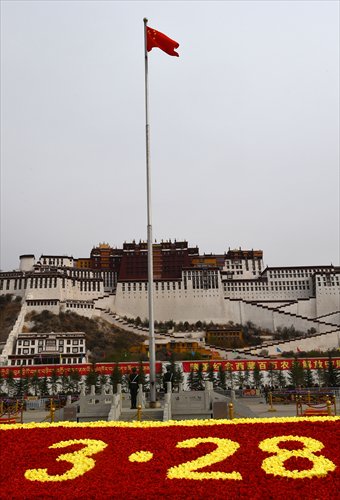China eyes end to Dalai clique on Tibet Serf Emancipation Day
Dalai Lama desperate to draw attention

Two soldiers stand guard under a national flag in front of the Potala Palace in Lhasa, capital of the Tibet Autonomous Region on Monday, as the region celebrates Serf Emancipation Day which marks the end of the Dalai Lama's rule 57 years ago. Photo: Xinhua
China's Tibet Autonomous Region on Monday celebrated Serf Emancipation Day, as the chairman of the Tibet government vowed to fight separatism and said that the Dalai Lama clique is "doomed to fail."
Experts are also saying that as the Dalai clique's international influence is on the wane, the group has been desperate to fabricate stories or stage protests in order to draw attention, but this will in return hurt their own image.
"The clique of the 14th Dalai Lama has never ceased its attempts to split China. Such activities run counter to the Constitution, State system and the interests of all people in Tibet, and are doomed to fail," said Losang Jamcan, chairman of the Tibet government, in a televised speech on Monday.
The clique cannot deny the great achievements Tibet has made under the leadership of the Communist Party of China (CPC), Losang Jamcan said, adding that Tibet can only continue to advance and prosper by following the CPC's leadership and the path of socialism.
China launched Serf Emancipation Day in 2009 to mark the democratic reform that freed 1 million people, or 90 percent of Tibet's population at the time, from the feudal serf system on March 28, 1959, shortly after the Dalai Lama fled to India.
Before the reform, serfs were regarded as salable private property subject to cruel punishment such as mutilation or amputation, according to news portal Tibet.cn.
"Abolishing serfdom was one of the most profound social changes in Tibet's history. On the other hand, the day serves to remind people that the Dalai Lama was the representative of a system that deprived over 90 percent of the Tibetan people of their basic rights before 1959," Guo Kefan, deputy director of the Contemporary Tibetan Research Institute at the Tibet Autonomous Region Academy of Social Sciences told the Global Times on Monday. "Looking from this perspective, it would not make sense to see him as a symbol of democracy and human rights as he is often portrayed today."
The launch of Serf Emancipation Day also came a year after riots broke out in the Tibetan capital Lhasa in March 2008 that killed 18 people and set a dozen shops ablaze. China said evidence has revealed that the riots were planned by the Dalai Lama.
Increasingly sidelined
Many Chinese scholars and analysts who are closely watching the development of the Dalai Lama and his "government-in-exile" said the group has been increasingly sidelined on the international stage and there are signs that the group will eventually split and collapse.
Zhu Weiqun, chairman of the Chinese People's Political Consultative Conference's Ethnic and Religious Affairs Committee told the Global Times that the Dalai Lama group is mired in a dilemma and that it wishes to instigate more self-immolation events to attract global attention to save its declining influence but is concerned that doing so would prompt a backlash that would hurt the Dalai Lama's "non-violent" and "peaceful" image.
Zhu also pointed out that given the Dalai Lama's age - he is 80 - political succession and religious reincarnation after the spiritual leader's death has become increasingly urgent for his followers which very much aggravates the infighting within the "exile government."
"There are indications that the Dalai Lama group's failure is irreversible," Zhu said. "However, under certain circumstances, it is still capable of provoking trouble."
Zhu's opinion was echoed by Guo, who said two scenarios may happen after the Dalai Lama's death.
One scenario indicates that the group will further split with some resolve to extreme means to seek "Tibet independence," and the other is that a substantial portion of exiled Tibetans would return to Tibet and the group would gradually dissolve.
On Monday morning, some 3,000 people gathered at the Potala Palace Square in Lhasa to watch the flag-raising ceremony.
China Central Television also aired a documentary over the weekend that showed the conditions of Tibetan serfs before 1959 and how the abolition of the system came about.
Tibet's GDP surpassed 100 billion yuan ($15 billion) in 2015 after 23 years of double-digit growth.
Per capita disposable income for its rural residents increased to 8,244 yuan last year, double that of 2010.
The region has also led the country in offering 15-year free education and free health check-ups for rural and urban residents.